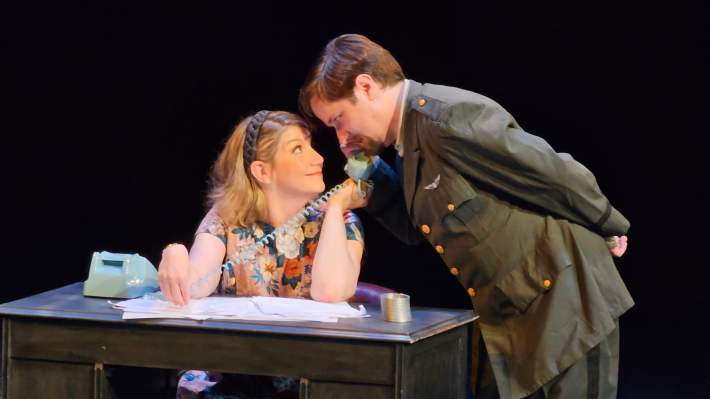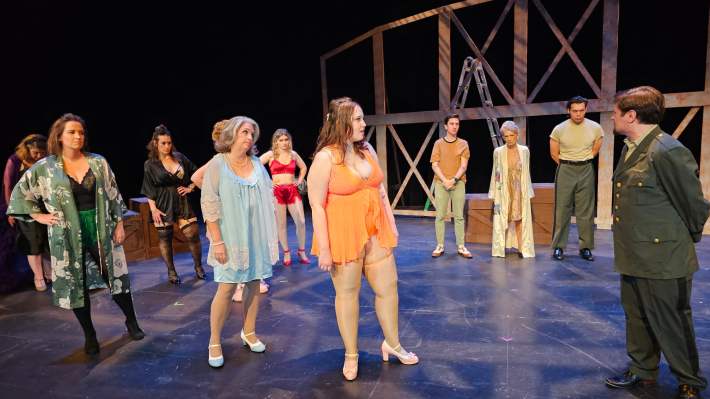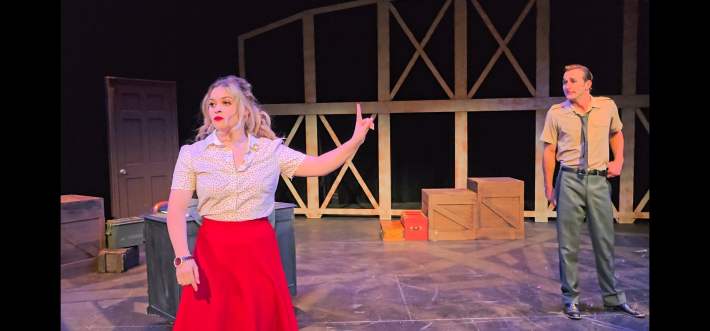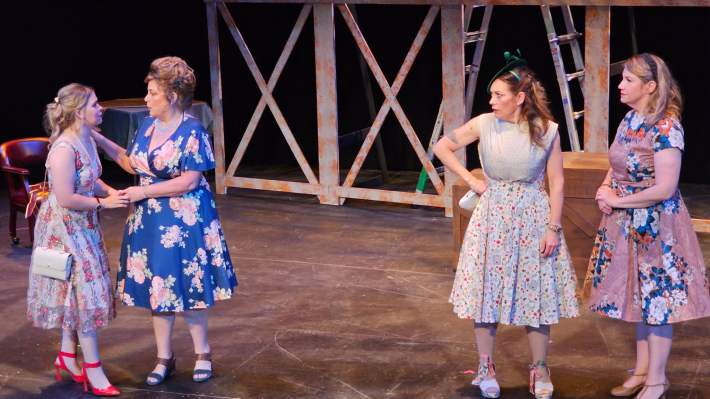Pembroke Players: "Lysistrata"
Tulsa Performing Arts Center, Liddy Doenges Theatre
June 20, 2025
When lighting design, music choices, acting, directing, and a script come together in a play and work in cohesion, the final result can be magical. But it’s difficult and rare to achieve this—especially when the project is an adaptation of a play that’s almost 2,500 years old, when the adaptation is set in its own specific time and place, and when it’s trying to connect, through all those layers, to the present moment.
The marketing I saw online of Pembroke Players’ new version of Lysistrata promised an evening of female empowerment (complete with show merchandise with punny phrases like “Lysten to women”). The Ancient Greek satire, written by Aristophanes and performed for the first time in 411 BC, follows Athenian Lysistrata, who calls upon the women of Greece to take part in a sex strike, determined it will end the Peloponnesian War. The men, wrecked by lust, wander around in agony, and insanity ensues. (And yes, the strike works; by the end of the play, the warring powers sign a peace treaty.) It wouldn’t be a Pembroke production without a twist. For this one, dramaturg Meagan Mulgrew adapted the script to set it during the height of the Vietnam War, another moment in world history where military and gender tensions ran high, and public opposition to war and the draft had reached a fever pitch.
Presented on a weekend when the U.S. was literally bombing Iran, this Lysistrata had the advantage of timeliness. The audience seemed attentive and, in the lobby afterwards, invigorated. I came away with more mixed feelings.

Production-wise, Pembroke Players exceeded my expectations. The Liddy Doenges Theatre—whose lighting grid doesn’t give a crew much to work with—has never looked more professional, thanks to Mallory Lindsay’s excellent lighting design. With her use of color and the way she isolated parts of the stage, her work was of a caliber that I’d expect from a nationally-touring Broadway show. Paired with Rich Goss’ stripped-down but versatile set, that lighting design made the play’s different locations believable. Director Madalene Steichen found clever ways to use the whole space; scenes stayed tight and choreographed transitions flowed quickly.
The cast gave a wealth of rich performances. Davis Simpson (who played Cineseas, an Athenian general) projected the infectious energy and body contortions of a cartoon character. Tine Beyaert, Gayla Lindsay and Alyssa McCoy owned the stage with their powerful and confident performances as an ensemble of women who, though they don’t have husbands in the army, have personal reasons for joining the protest against the war. Jenny Guy was both funny and grounded as Lysistrata, keeping her reason for instigating and continuing the protest—the death of her brother—always at the forefront of her performance.
These production highlights reached a peak in a dynamic dinner party scene at the end of Act One, in which Lampito (Kathleen Hope) and Calonike (Kelli Lowe), two of the generals’ wives joining Lysistrata’s plan, attempt to convince their husbands to end the draft. Hope’s dynamic and billowing performance was constantly punctured by Lowe’s dry and witty humor that packed a punch to the heart. With their stage husbands, teddy bear John Orsulak and John “Top Gun” Lindsay, they created a synergistic magic that was both funny and devastating.

To be consistently funny and devastating, the whole play would have needed to do a few things differently.
First, it would have examined its feminist take more closely. A common critique of second-wave feminism goes like this: such feminists (often white and affluent) only really start to care about a crisis when it impinges on their own lives. This Lysistrata fell right into that trap.
In the original play, Lysistrata unites women on both sides of the war in her plan; the character Lampito is notably Spartan, in a play about Athenians. But in Pembroke’s adaptation, Lysistrata’s plan only extended to the American side; notably, for a play about the Vietnam War, everything we saw on stage neglected the Vietnamese side entirely. The characters consisted of American generals who work at the war camp, their wives, and other women in the community who are directly impacted by the war, usually due to the death of a family member. Some of the women in the chorus expressed dissent for the war because of the harm it caused overseas, but the production’s opening scene made it clear that the women in this play were drawn into protest mainly because men they know have been or might be affected by the conflict.
More self-awareness about the problematic nature of this variety of feminism (which, to be fair, was the predominant variety of the Vietnam War era) would have helped the script land more strongly in the present day.
Additionally, as a woman in the audience, I did not feel empowered by the adaptation’s central message. The success of Lysistrata’s plan hinges on whether the generals’ wives can convince them to end the draft. After Lysistrata, Lampito, and Calonike failed to do so, the pressure fell on the fourth woman of the group, Myrrhine. What ensued was a (frankly) fun strip tease scene, where Myrrhine used her lingerie-clad body to seduce Cineseas in an attempt to convince him to join the women’s side. He did just that, citing he could not deny his “hot wife” anything she wanted. While there was a thread of historical accuracy here—reflecting that the play was indeed set in the 1960s when women had little power—it still told the modern audience that Lysistrata’s strategic aptitude would never be enough. In order to be heard, a woman must first be physically attractive in a man’s eye.

Cineseas did praise Lysistrata for her smarts and leadership skills after the fact, but it was buried in a final scene that quickly wrapped up several plot lines. If presented as satire, all of these elements could have created a sharp commentary on gender roles, but in a play that touted an earnest feminist message, it left a sour taste in my mouth.
Which leads me to my next point: The play’s beat-for-beat plot really only works when the material is approached as satire. The fact that the four main women so quickly agreed to join Lysistrata’s sex strike, the idea of the sex strike as a meaningful way to stop the war to begin with, the fact that it only took 24 hours before the army camp fell into disarray, the fact that all of the men were so loyal to their wives that they wouldn’t go ease their sexual urges with another woman, the fact that Cineseas was so easily and comically persuaded by his wife’s body—all these scenarios would work, and be quite biting, if the play had been presented strictly as a satire.
But the script insisted on grounding the play in reality: we were constantly reminded about the devastations of war. Lysistrata nearly broke down several times, affected deeply by the death of her brother. The women lamented that they found armed conflict pointless. And yet, despite its push toward realism, the play rarely touched on other, just as relevant, realities of this era—such as the fact that the second wave feminist movement was pushing back against things like domestic violence, sexual assault (marital rape was still legal at that time), and the lack of reproductive rights.
Neglecting these realities while highlighting the ones associated with war—specifically death and the trauma that creates for those back home in America—created a fractured tableau. I saw traces of reality on stage, but the comedic elements consistently pulled my attention away and told me to buy into something that felt unrealistic. Ultimately, this created a story that didn’t feel believable, nor did I feel compelled to believe in it.

Finally, like its vacillation between satire and drama, the production’s ping-pong between eras felt more like whiplash. The script consistently tried to hold a mirror up to our current society, to show us how history is repeating itself, by incorporating modern language and colloquial phrases like “let’s go girls” and “it’s my body, my choice” that, in the 2020s, have become feminist slogans. The modern songs by artists like Hozier and Beyonce that the director chose for key moments and transition scenes did fit the intended tone, but it’s impossible to extract them from their modern contexts. These elements served more as a distraction from the message of the play, while loosely maintaining the parallel to today. But when the message feels outdated in 2025, the political and feminist commentary comes across as disingenuous.
This script did have pockets of truth that stuck with me—for instance, the story of Leander, played by Michael Cossey, a young, healthy boy who’s expected to enlist in the army but doesn’t want to. His defiance, emphasized by an overt “it’s my choice” speech, showed that patriarchy doesn’t just negatively impact women—men can end up in the crossfire as well.
Another moment that landed with authenticity: Before going into Cineseas’ office to seduce him, Myrrhine expressed her fear to fully join the sex strike, worried that if he didn’t listen to her, she’d never be able to look at him the same way again and that she’d lose a very close, very special connection. With Peterson’s raw delivery, I immediately thought of moments where either I myself or a close friend expressed a similar fear.
And again, I think of the dinner scene, when the women’s attempt to convince their husbands failed, and the men struggled to believe that their wives would even consider taking part in a sex strike. One exchange between Calonike and her husband struck me so deeply I felt my chest lurch. “[E]ven if it wasn’t true [that we were striking], I wouldn’t have sex with you anyway,” she said to him. “Why?” he asked. “Because you laughed at us,” she answered.
In brief moments like these, the play put a spotlight on what feels like a very real, pressing anxiety modern women and men have when it comes to patriarchy: the fear that the man in charge does not respect them, their intelligence, their emotions, their desires. None of the relationships ultimately suffered from the strike (it was a comedy, after all), but I wished the play had explored that thread more. On paper, the decision to ground the play in emotional realism seems natural, as does comparing two situations in which gender and warfare have collided. But this adaptation attempted to ground satire with so much gravity—and so much on-the-nose feminism—that I thought it missed the mark as both comedy and political commentary.
Pembroke Players does not shy away from taking big swings. In an arts culture where theatre companies are losing their grants and choosing to repeat popular shows to get audiences in seats, I feel lucky that plays like Lysistrata exist in Tulsa. I’m grateful to have seen an original adaptation of an ancient play in the Liddy that addressed the very relevant issue of war, took risks, and brought me many ideas to meditate on, even if it left me feeling unsatisfied.






